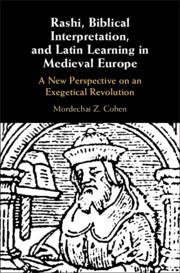 Rashi, Biblical Interpretation, and Latin Learning in Medieval Europe
Rashi, Biblical Interpretation, and Latin Learning in Medieval Europe Published online by Cambridge University Press: 15 April 2021
Precedents for various aspects of Rashi’s exegetical program, as discussed in the previous three chapters, can be identified within two Jewish schools of learning, the Andalusian and Byzantine, as well as in the application of the discipline of grammatica to the Bible as attested at the cathedral school of Rheims. Rashi does not mention any Andalusian authors beside Menahem and Dunash, who, uncharacteristically, wrote in Hebrew rather than Arabic, nor does he ever refer to the Byzantine exegetical school. As discussed in the preceding two chapters, this suggests that Rashi was, in fact, unfamiliar with their exegetical accomplishments. Rashi, of course, does not mention Bruno or any other Remois interpreters either. But that silence does not necessarily indicate that he was unaware of the Christian interpretive school. If Rashi knew of the Arabic-writing Jewish Andalusian or Jewish Byzantine philologically oriented Bible commentators, he almost certainly would have cited them as authoritative sources – as he does Menahem and Dunash. On the other hand, Rashi understandably would not have cited Bruno, Remigius, or other Christian interpreters as authorities on the Bible. Furthermore, the hypothesis of “influence” raised in Chapter 3 is not that Rashi consciously adopted Christian interpretive methods, but rather that the grammatical Christological mode of reading advanced by Bruno and his circle at Rheims could have come to Rashi’s attention and posed a challenge that spurred him to develop an opposing Jewish interpretation “settled upon” the language and sequence of Scripture.
To save this book to your Kindle, first ensure [email protected] is added to your Approved Personal Document E-mail List under your Personal Document Settings on the Manage Your Content and Devices page of your Amazon account. Then enter the ‘name’ part of your Kindle email address below. Find out more about saving to your Kindle.
Note you can select to save to either the @free.kindle.com or @kindle.com variations. ‘@free.kindle.com’ emails are free but can only be saved to your device when it is connected to wi-fi. ‘@kindle.com’ emails can be delivered even when you are not connected to wi-fi, but note that service fees apply.
Find out more about the Kindle Personal Document Service.
To save content items to your account, please confirm that you agree to abide by our usage policies. If this is the first time you use this feature, you will be asked to authorise Cambridge Core to connect with your account. Find out more about saving content to Dropbox.
To save content items to your account, please confirm that you agree to abide by our usage policies. If this is the first time you use this feature, you will be asked to authorise Cambridge Core to connect with your account. Find out more about saving content to Google Drive.